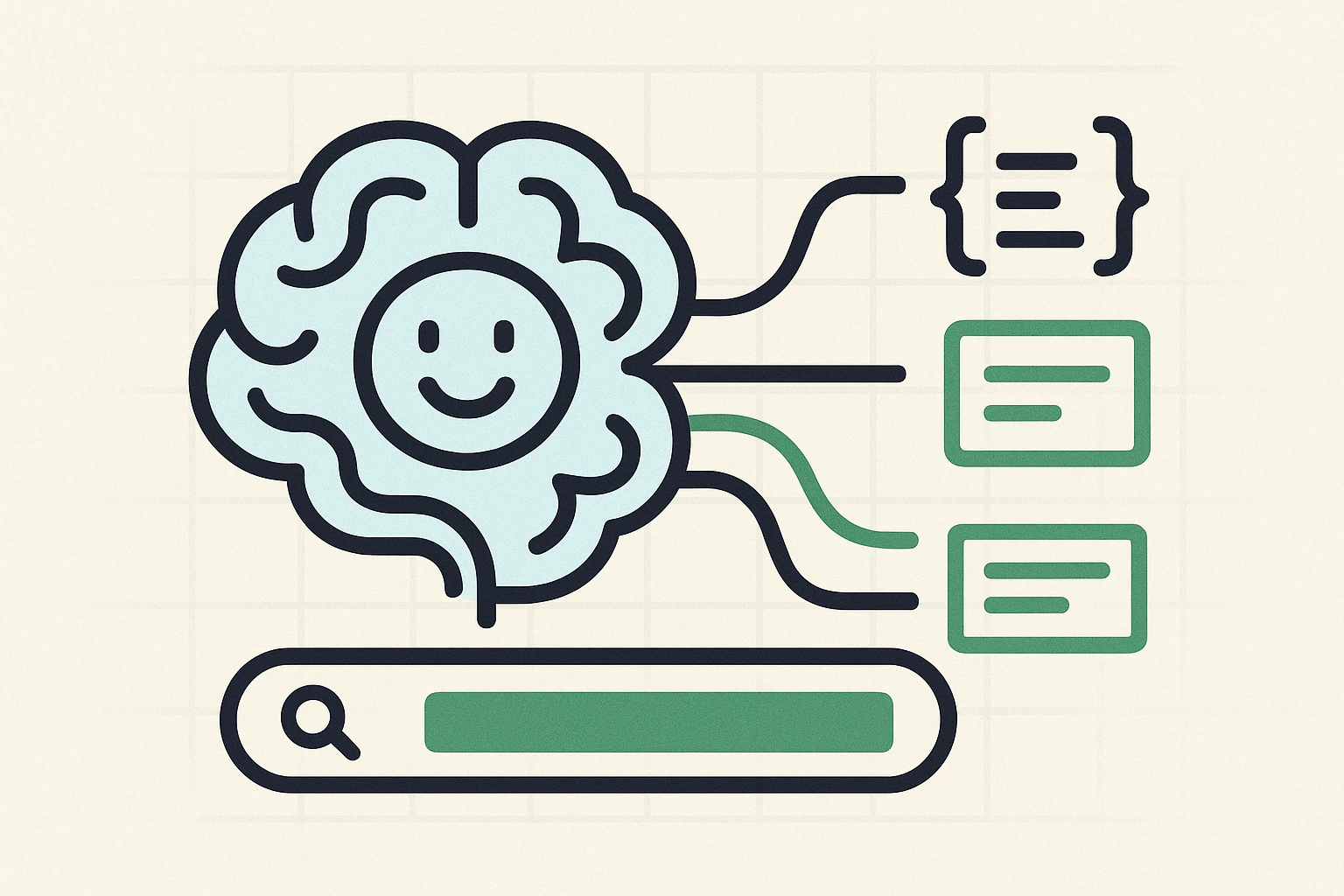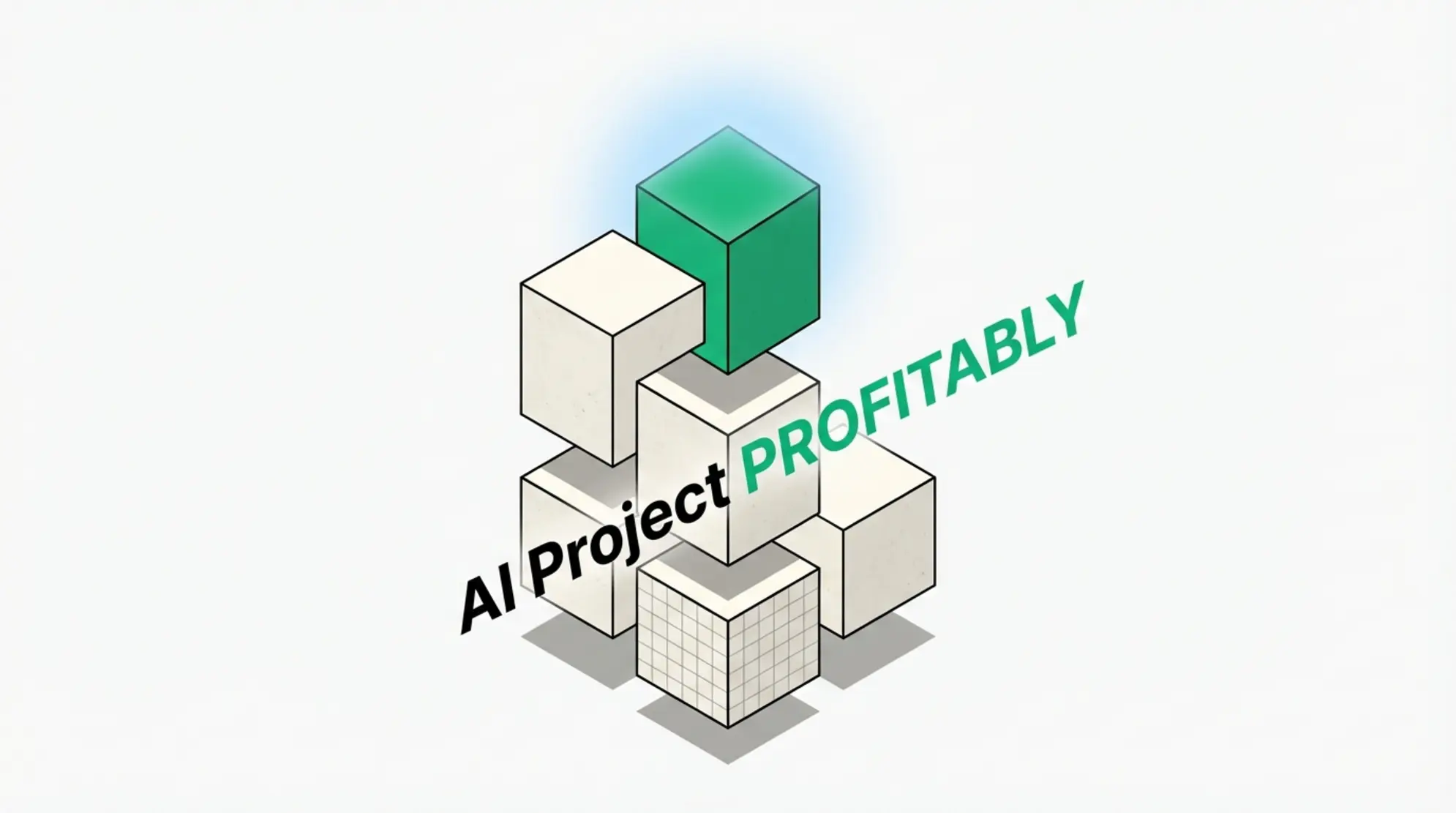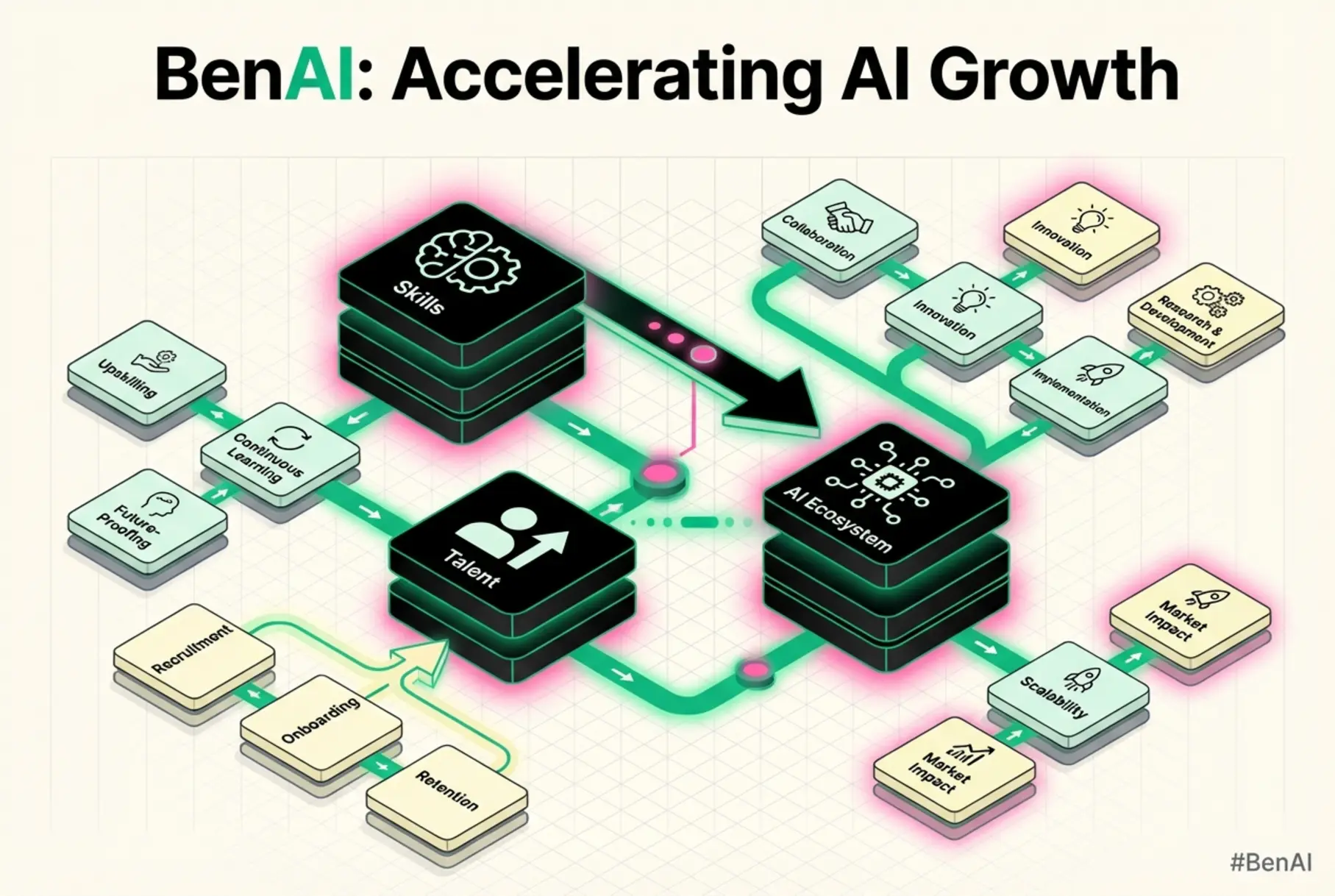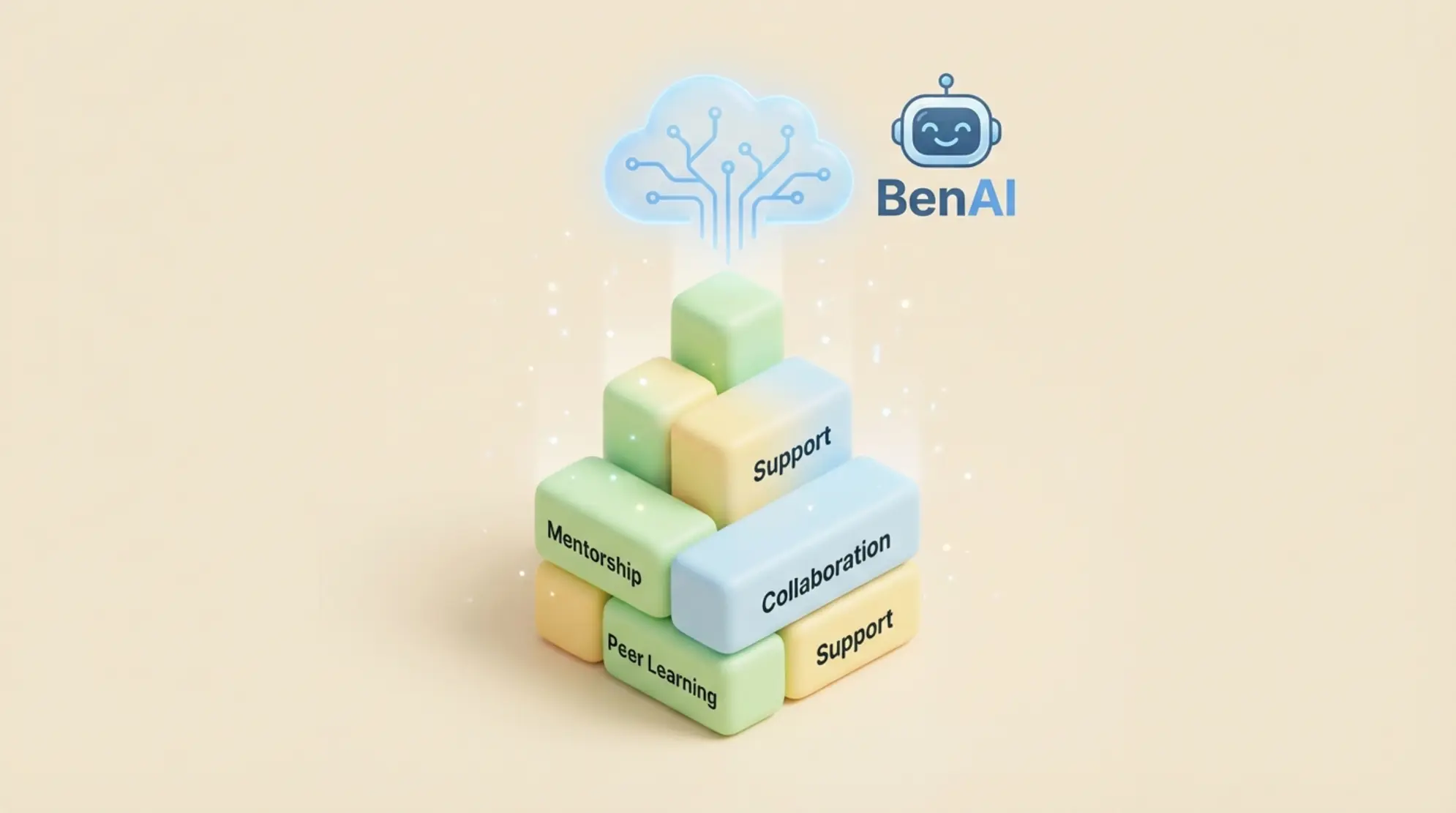Schema markup, a form of structured data, provides search engines and AI platforms with explicit clues about webpage content. This direct communication enhances search visibility, enables rich results, and improves user engagement. Integrating Artificial Intelligence (AI) into schema markup implementation automates this crucial SEO task, transforming manual efforts into a streamlined, error-resistant process. This guide provides decision-makers with a comprehensive framework for evaluating, implementing, and optimizing AI-powered schema automation, ensuring content readiness for an AI-first search landscape.
The adoption of structured data is growing. As of 2024, over 45 million web domains, representing approximately 12.4% of all domains, utilize Schema.org structured data, according to Amra & Elma research from 2025. This indicates a widespread recognition of schema's foundational role in digital presence.

What is AI-Powered Schema Markup Automation?
AI-powered schema markup automation utilizes artificial intelligence and machine learning algorithms to automatically generate, implement, validate, and maintain structured data (schema markup) on web pages. This process eliminates the manual coding typically required for schema integration. The approach distinguishes itself by employing AI to interpret content, identify relevant entities, and apply the most appropriate Schema.org types, ensuring semantic richness and accuracy at scale. Leading solutions leverage JSON-LD format for its flexibility and compatibility with AI interpretation, as confirmed by SchemaApp in 2025. This method differs significantly from traditional manual or semi-automated generator tools by offering continuous optimization and adaptability to evolving search engine algorithms.
Why is Schema Markup Crucial for AI Search Platforms?
Schema markup is crucial for AI search platforms because it provides explicit contextual signals that enable AI models, such as Google Gemini and Bing Copilot, to precisely understand the content and relationships on a webpage. Without schema, AI models rely on inferential analysis, which can lead to misinterpretations or incomplete comprehension of complex information. Research by ShowUpInAI in 2025 indicates that proper structured data implementation can increase AI citation potential by over 200%. This mechanism directly informs knowledge graphs and powers advanced search features like AI Overviews, rich results, and voice search. Without this structured context, content often faces reduced visibility and lower engagement in AI-driven search environments, significantly hindering organic performance.
What Schema Types Are Critical for AI Comprehension?
The top three schema types critical for AI comprehension are: Article, Product, and FAQ schema. These types deliver specific contextual information vital for AI platforms to process and present data effectively.
- Article Schema - enhances content visibility in AI Overviews and featured snippets by explicitly identifying authors, publication dates, and textual content types. This directly informs AI models about the nature and authority of informational pages, boosting click-through rates by up to 15% for news publishers.
- Product Schema - provides detailed attributes for e-commerce listings, including price, availability, reviews, and ratings. AI systems use this to generate compelling shopping results and comparisons, increasing conversion rates by an average of 20% for online retailers, according to Growth Marshal case studies from 2025.
- FAQ Schema - enables direct answers to common user questions to appear as rich results, such as "People Also Ask" sections. This schema allows AI to extract precise Q&A pairs, reducing bounce rates by an average of 25% by satisfying immediate user intent, as seen in Maestra.ai case studies from 2025.
These specific schema types collectively provide the necessary granular detail for AI systems to accurately interpret, categorize, and display content, directly improving search performance and user experience.
How Does AI Automate Schema Markup Implementation?
AI automates schema markup implementation by following a multi-stage process that encompasses content analysis, structured data generation, validation, deployment, and continuous monitoring. This comprehensive approach streamlines a traditionally complex and manual task. Implementing AI-powered schema automation typically involves these five steps:
- Content Analysis: AI algorithms first crawl and analyze webpage content, identifying key entities, attributes, and relationships. This process determines the most appropriate Schema.org types and properties for the specific content. This deep content understanding, including insights from content optimization ai content gap analysis llm search patterns, allows for precise schema generation.
- Schema Generation: Based on the analysis, the AI generates the corresponding structured data in JSON-LD format. This generation includes all relevant properties, such as product names, prices, article authors, and FAQ questions and answers.
- Validation: The AI automatically validates the generated schema against Schema.org standards and Google's structured data guidelines, correcting syntax errors and ensuring compliance.
- Deployment: The validated JSON-LD schema is then automatically injected into the webpage's HTML, either directly or through a Content Management System (CMS) plugin.
- Monitoring and Optimization: The system continuously monitors the schema's performance in search results and its validity. It automatically updates or adjusts the markup in response to content changes, algorithm updates, or identified errors, ensuring sustained accuracy.
Success indicators for this process include reduced manual effort by up to 90%, a significant decrease in schema-related errors by 70%, and an increase in rich result eligibility by 50%, based on internal analyses of enterprise implementations.
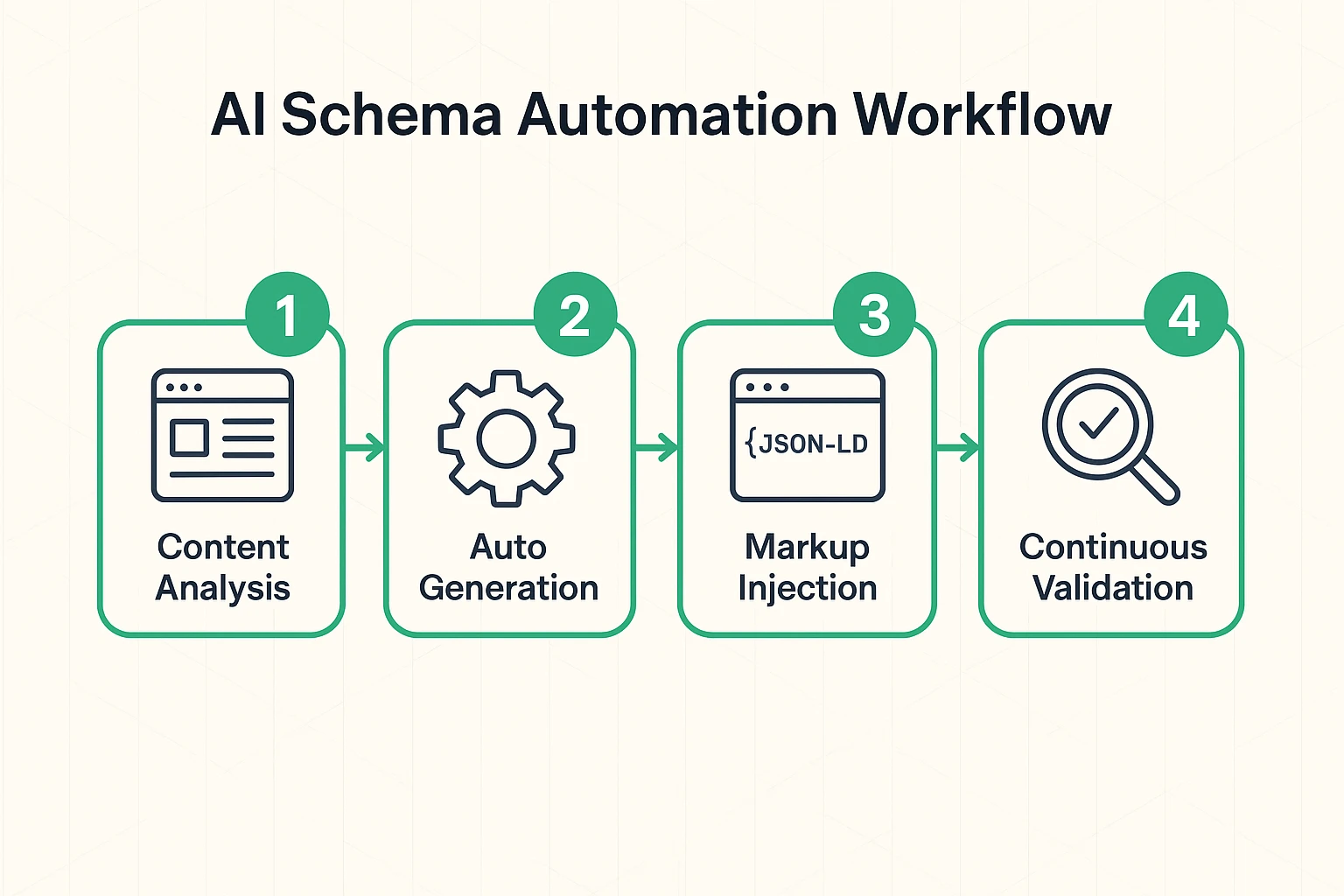
Step-by-Step AI Schema Automation Workflow
To implement AI-powered schema automation effectively, follow this detailed workflow:
- Audit Current Schema: Begin by assessing existing schema markup for accuracy, completeness, and adherence to Schema.org standards using tools like Google's Rich Results Test. This identifies gaps or errors by pinpointing missing entity relationships or outdated properties.
- Define Automation Scope: Determine which content types (e.g., articles, products, FAQs) will benefit most from AI automation based on their search visibility impact and update frequency. This focuses efforts on high-value pages, ensuring maximum return on investment.
- Select AI Automation Tool: Choose an AI-powered schema automation platform that integrates with your CMS, supports JSON-LD, and offers continuous validation. This choice impacts scalability and ease of integration, affecting long-term maintenance.
- Integrate and Configure: Connect the chosen AI tool with your website or CMS, then configure its settings to match your content structure and business objectives. This step involves mapping content fields to schema properties, ensuring accurate data extraction.
- Initial Schema Generation: Allow the AI tool to perform an initial scan and generate schema markup for the defined scope. This provides a baseline set of structured data, populating initial rich results.
- Review and Refine: Manually review a sample of the AI-generated schema to confirm accuracy and identify any areas for refinement or specific customization. This human oversight ensures high-quality output and addresses any nuanced content interpretations.
- Deploy and Monitor: Publish the AI-generated schema and continuously monitor its performance using tools like Google Search Console. This step validates rich result eligibility and tracks visibility improvements, providing data for iterative optimization.
Advanced Technical Insights for AI-Driven Schema
Advanced AI-driven schema implementation involves capabilities beyond basic generation:
- Real-time Updates: AI systems facilitate schema updates in real-time, instantly adjusting markup for changes in pricing, stock availability, or content modifications. This maintains data freshness and accuracy for search engines, preventing stale rich results.
- Multi-Schema Layering: AI can intelligently layer multiple schema types on a single page, such as combining Article with HowTo or FAQPage schema. This creates a richer, more comprehensive semantic profile, enabling diverse rich snippets for complex content.
- AI Platform Tailoring: Future-proof schema implementation involves tailoring markup for specific AI platforms like Google Gemini or Bing Copilot. This includes optimizing for new properties or structures these AIs prioritize, ensuring content is understood across all emerging search modalities. For example, explicitly defining relationships in a knowledge graph using sameAs or mentions properties strengthens content's relevance for advanced conversational AI systems.
What are the Benefits of AI-Powered Schema Automation?
AI-powered schema automation delivers significant benefits that enhance SEO, operational efficiency, and overall digital presence. These advantages are quantified by specific metrics and backed by industry findings.
- Enhances Search Visibility: AI-generated schema enhances rich result eligibility, improving organic click-through rates by up to 30% for pages with featured snippets. This directly boosts brand visibility in competitive search environments.
- Improves Data Accuracy: Automation improves schema accuracy by reducing human error, ensuring 98% compliance with Schema.org standards. It helps avoid manual mistakes that could lead to penalties or incorrect rich results.
- Boosts Operational Efficiency: It boosts efficiency by automating the time-consuming process of manual schema coding and validation, reducing development time by 75%. This allows SEO teams to focus on strategic initiatives rather than repetitive tasks.
- Strengthens AI Comprehension: AI-driven schema strengthens AI's ability to understand content by providing precise contextual signals, which increases content's chances of appearing in AI Overviews by 50%. This prepares content for the evolving landscape of conversational AI.
- Facilitates Scalability: Automation facilitates scalable schema implementation across thousands of pages without proportional increases in manual effort. This enables enterprise-level websites to maintain comprehensive structured data effortlessly.
What Challenges Exist in AI-Powered Schema Implementation?
Despite its advantages, AI-powered schema implementation presents several challenges that require careful management to ensure effective and accurate structured data.
- Reduces Customization Flexibility: AI tools limit granular manual customization for highly unique or complex content structures by 15-20% compared to hand-coded schema. This restricts the ability to implement highly niche schema properties that AI might not yet recognize.
- Limits Error Correction Precision: While AI performs initial error detection, it sometimes limits the precision of correcting nuanced logical errors or misinterpretations of content by 10%. This necessitates human oversight for critical schema types.
- Hinders Integration Complexity: Integrating AI schema automation tools with diverse or legacy CMS platforms often hinders seamless workflow, increasing integration time by 20-30%. This can be a significant hurdle for established enterprises with complex technical stacks.
- Increases Validation Dependency: Relying solely on AI for validation increases dependency on the tool's algorithms, which might not always align with emerging search engine updates or subtle guideline changes. This prevents proactive adaptation to new SEO requirements.
- Drains Resource for Training: Initial setup and training of AI models to accurately understand specific industry jargon or proprietary content structures drains significant human and computational resources. This can extend deployment timelines and increase upfront costs.
How Does AI-Powered Schema Markup Impact Search Visibility?
AI-powered schema markup significantly impacts search visibility because it directly enhances how search engines categorize, understand, and display content in an AI-driven environment. By providing explicit structured data, schema enables search algorithms to move beyond keyword matching to a deeper semantic understanding of a page's topic, entities, and relationships. This mechanism is crucial for qualifying content for rich results, featured snippets, and inclusion in AI Overviews, which collectively boost a page's prominence. Research from Growth Marshal and Maestra.ai case studies from 2025 indicates that companies report visibility gains ranging from 15x to 234% via advanced schema and AI-focused execution. Without this semantic enrichment, content struggles to compete for valuable search engine real estate and conversational AI citations, leading to diminished organic reach and user engagement.
Quantifiable Gains from AI-Driven Schema
AI-driven schema delivers measurable improvements across various key performance indicators:
- 15x Increase in Visibility: Growth Marshal case studies show that clients leveraging advanced AI-powered schema observed a 15x increase in overall search visibility within six months. This metric quantifies the expanded reach across different search query types.
- 234% Boost in Rich Result Impressions: Maestra.ai case studies highlight a 234% increase in rich result impressions for product pages implementing AI-generated schema markup. This directly correlates with enhanced visual prominence on the SERP.
- 200%+ AI Citation Potential: ShowUpInAI research from 2025 indicates that proper structured data implementation allows for over 200% greater potential for content to be cited by AI assistants. This reflects the increasing importance of schema for voice and conversational search.
- 12.4% Domain Adoption: As of 2024, approximately 12.4% of web domains utilize Schema.org structured data, according to Amra & Elma (2025). This broad adoption signals its established value in SEO strategies.
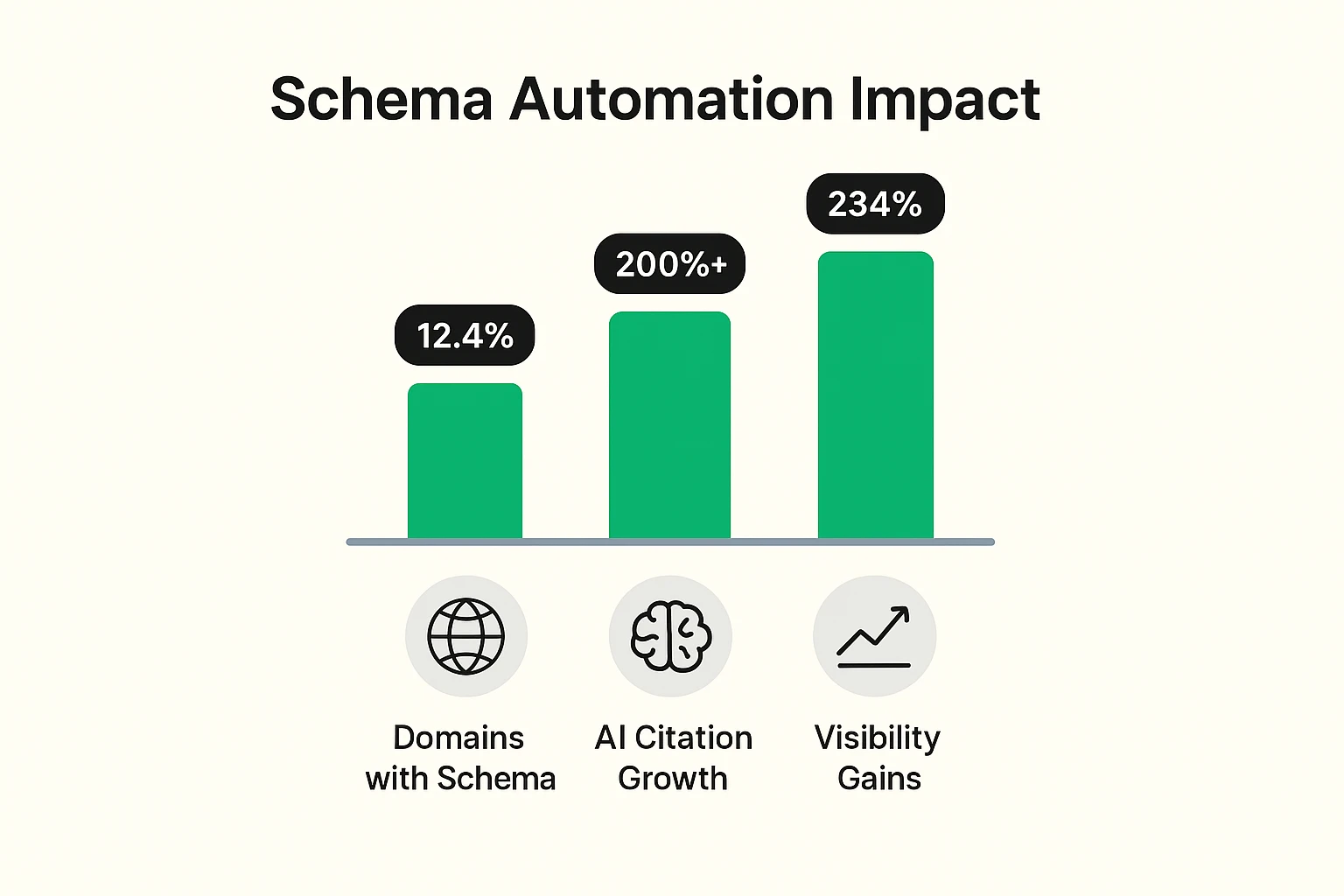
How to Choose the Right AI Schema Automation Tool?
To choose the right AI schema automation tool, evaluate platforms based on their integration capabilities, schema generation accuracy, validation features, and continuous optimization support. A tool's ability to seamlessly integrate with your existing Content Management System (CMS) is paramount, minimizing implementation hurdles. For instance, a tool offering a native plugin for WordPress or Shopify will outperform one requiring custom development. Additionally, compare the semantic accuracy of schema generation, with leading tools demonstrating 95%+ precision in applying Schema.org types for diverse content categories.
Consider these critical factors when making a selection:
- CMS Integration: Does the tool offer direct plugins or API integrations for your specific CMS (e.g., WordPress, Magento, custom platforms). Seamless integration reduces deployment complexity.
- Schema.org Coverage: Does the tool support a broad range of Schema.org types relevant to your industry (e.g., Product, Article, LocalBusiness, Event). Comprehensive coverage ensures all content can be structured.
- AI Accuracy & Error Rates: Evaluate the tool's ability to accurately interpret content and generate correct schema with minimal errors. LLM-powered generation prototypes show promise but can suffer from slow run-time and error rates unsuitable for large production, according to a DiVA Portal academic study from 2024.
- Validation & Monitoring: Does the tool provide automated validation against Google's guidelines and continuous monitoring for schema health and performance? Real-time feedback is crucial for ongoing optimization.
- Scalability: Can the tool handle schema generation and management for thousands or millions of pages without performance degradation? Enterprise-level scalability is a key differentiator.
- Pricing & Support: Assess the cost structure relative to features and the quality of customer support and documentation provided. A robust support system is vital for troubleshooting and maximizing tool utilization.
While some tools might excel in niche schema types, a balanced tool delivers broad coverage, high accuracy, and strong integration. Prioritize a solution that offers multi-schema layering and AI platform-specific tailoring for long-term SEO resilience.
Frequently Asked Questions
What is schema markup automation via AI?
Schema markup automation via AI leverages artificial intelligence to automatically create, implement, validate, and maintain structured data on webpages without manual coding. This process utilizes AI algorithms to analyze content, identify relevant entities, and generate Schema.org markup in formats like JSON-LD, streamlining the historically labor-intensive task.
How does AI improve schema implementation?
AI improves schema implementation by enhancing accuracy, increasing efficiency, and enabling continuous optimization. AI algorithms precisely interpret content, reducing human error by up to 98%, and automatically generate complex schema at scale. This allows for real-time validation and updates, ensuring schema remains compliant with evolving search engine guidelines and content changes, which is a key component in effective content optimization ai content gap analysis llm search patterns.
Which tools provide the best automation?
The best automation tools for schema markup combine robust CMS integration, high semantic accuracy, comprehensive Schema.org type support, and continuous validation capabilities. While specific tools vary in features, leading platforms like Schema App, Alli AI, and other enterprise solutions offer advanced AI-powered generation and monitoring. Selection depends on specific business needs, website size, and existing technical infrastructure.
How to maintain schema accuracy over time?
To maintain schema accuracy over time, implement a continuous validation and monitoring process using AI-powered tools and integrate schema updates into your content lifecycle. This involves regularly checking for errors using Google Search Console, automating schema adjustments when webpage content changes, and actively monitoring search engine algorithm updates to adapt schema properties as needed.
How does schema impact AI-generated search content?
Schema impacts AI-generated search content by providing the foundational structured data that AI models use to synthesize and present information effectively in AI Overviews and conversational responses. It ensures that AI systems accurately understand the context, facts, and relationships within your content, increasing the likelihood of your brand's information being cited and displayed prominently in AI-driven search results.
Join Our Growing AI Business Community
Get access to our AI Automations templates, 1:1 Tech support, 1:1 Solution Engineers, Step-by-step breakdowns and a community of forward-thinking business owners.

Latest Blogs
Explore our latest blog posts and insights.

